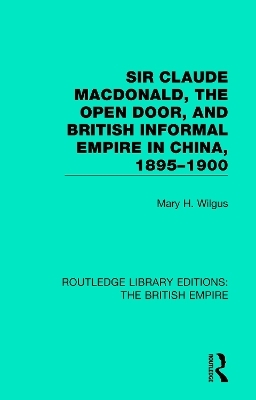
Sir Claude MacDonald, the Open Door, and British Informal Empire in China, 1895-1900
Seiten
2019
Routledge (Verlag)
978-0-8153-5960-9 (ISBN)
Routledge (Verlag)
978-0-8153-5960-9 (ISBN)
First published in 1987. Great Britain secured and expanded its informal empire in China during the five years following the Sino-Japanese War. In order to help the reader understand Britain’s informal empire in China, the author reviews the historical background which brought China into Britain’s expanding economy.
First published in 1987. Great Britain secured and expanded its informal empire in China during the five years following the Sino-Japanese War. From 1895 through 1900 Lord Salisbury accepted England’s traditional, commercially oriented China policy and adapted it to dramatically altered political conditions in East Asia. Through the efforts of Sir Claude MacDonald, Britain met the commercial and political challenges of its European competitors and implemented the "open door," a strong but maligned policy. With the assistance of Britain’s indigenous collaborators, England managed to maintain a greatly weakened Manchu dynasty and to increase its financial, commercial, and informal political power in China without the use of military force or formal alliance. In order to help the reader understand Britain’s informal empire in China, the author reviews the historical background which brought China into Britain’s expanding economy.
First published in 1987. Great Britain secured and expanded its informal empire in China during the five years following the Sino-Japanese War. From 1895 through 1900 Lord Salisbury accepted England’s traditional, commercially oriented China policy and adapted it to dramatically altered political conditions in East Asia. Through the efforts of Sir Claude MacDonald, Britain met the commercial and political challenges of its European competitors and implemented the "open door," a strong but maligned policy. With the assistance of Britain’s indigenous collaborators, England managed to maintain a greatly weakened Manchu dynasty and to increase its financial, commercial, and informal political power in China without the use of military force or formal alliance. In order to help the reader understand Britain’s informal empire in China, the author reviews the historical background which brought China into Britain’s expanding economy.
Mary H. Wilgus
1. Introduction 2. Trade Not Rule: Anglo-Chinese Relations 1689-1895 3. Entrenchment and Reaction: The Open Door Policy and Russophobia 4. "Gunboat" MacDonald: Britain’s Man-on-the-Spot, 1896-1900 5. Artificial Agency of Informal Empire: Sir Robert Hart and Imperial Maritime Customs Service 6. Principal Instruments of Empire: Railway Concessions 1895-1900 7. Practical Informal Empire: Loans, Trades, and Mining Concessions 8. Friends in High Places: Chinese Collaborations and Informal Empire, 1895-1900 9. Conclusion; Endnotes; Bibliography; Index
| Erscheinungsdatum | 24.09.2019 |
|---|---|
| Reihe/Serie | Routledge Library Editions: The British Empire |
| Verlagsort | New York |
| Sprache | englisch |
| Maße | 138 x 216 mm |
| Gewicht | 385 g |
| Themenwelt | Geisteswissenschaften ► Geschichte ► Allgemeines / Lexika |
| Geisteswissenschaften ► Geschichte ► Allgemeine Geschichte | |
| Geisteswissenschaften ► Geschichte ► Regional- / Ländergeschichte | |
| Geschichte ► Teilgebiete der Geschichte ► Wirtschaftsgeschichte | |
| ISBN-10 | 0-8153-5960-8 / 0815359608 |
| ISBN-13 | 978-0-8153-5960-9 / 9780815359609 |
| Zustand | Neuware |
| Haben Sie eine Frage zum Produkt? |
Mehr entdecken
aus dem Bereich
aus dem Bereich


